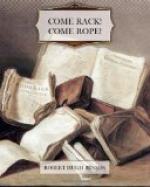II
The tidings came to Marjorie as she leaned back in her chair in Mr. Biddell’s parlour and listened to the last shoutings.
* * * * *
She had been in town now three days.
Ever since the capture she had been under guard in her own house till three days ago. Four men had been billeted upon her, not, indeed, by the orders of Mr. Audrey, since Mr. Audrey was in no condition to control affairs any longer, but by the direction of Mr. Columbell, who had himself ridden out to take charge at Booth’s Edge, when the news of the arrest had come, with the prisoner himself, to the city. It was he, too, who had seen to the removal of Mr. Audrey a week later, when he had recovered from the weakness caused by the fit sufficiently to travel as far as Derby; for it was thought better that the magistrate who had effected the capture should be accessible to the examining magistrates. It was, of course, lamentable, said Mr. Columbell, that father and son should have been brought into such relations, and he would do all that he could to relieve Mr. Audrey from any painful task in which they could do without him. But her Grace’s business must be done, and he had had special messages from my lord Shrewsbury himself that the prisoner must be dealt with sternly. It was believed, wrote my lord, that Mr. Alban, as he called himself, had a good deal more against him than the mere fact of being a seminary priest: it was thought that he had been involved in the Babington plot, and had at least once had access to the Queen of the Scots since the fortunate failure of the conspiracy.
All this, then, Marjorie knew from Mr. Biddell, who seemed always to know everything; but it was not until the evening on which the judges arrived that she learned the last and extreme measures that would betaken to establish these suspicions. She had ridden openly to Derby so soon as the news came from there that for the present she might be set at liberty.
The lawyer came into the darkening room as the square outside began to grow quiet, and Marjorie opened her eyes to see who it was.
He said nothing at first, but sat down close beside her. He knew she must be told, but he hated the telling. He carried a little paper in his hand. He would begin with that little bit of good news first, he said to himself.
“Well, mistress,” he said, “I have the order at last. We are to see him to-night. It is ‘for Mr. Biddell and a friend.’”




